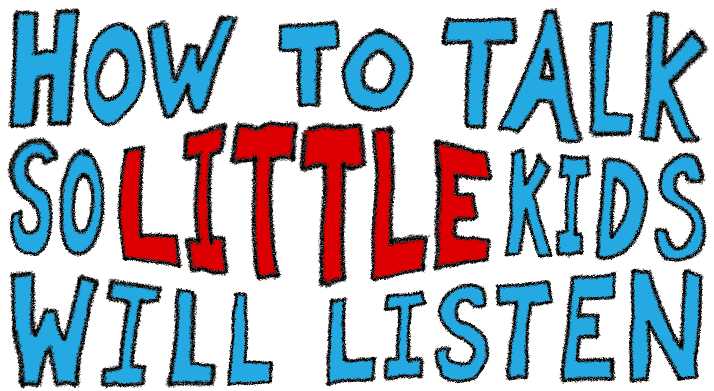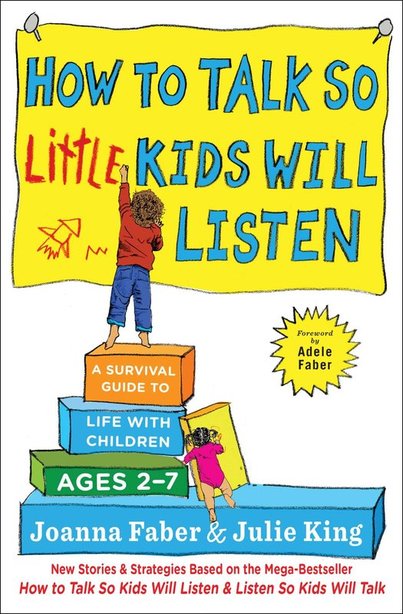|
By Brianna
How to Talk So Little Kids Will Listen: A Survival Guide to Life with Children Ages 2-7, by Adele Farber and Elaine Mazlish
Summary:
In October 1980, Adele Faber and Elaine Mazlish published How to Talk So Kids Will Listen & Listen So Kids Will Talk. It became a bestseller in the world of parenting books, and has stayed relevant in the ensuing decades with various updates. In January 2017, Faber’s daughter, Joanna Faber, wrote a more specific version of this classic guide with her friend, Julie King. Joanna and Julie both grew up with their parents using the principles in the original How to Talk, but found they were still sometimes stumped when it came to the very young children in their lives. After many workshops, they wrote How to Talk so Little Kids Will Listen: A Survival Guide to Life with Children Ages 2-7. This book takes the principles and tools from Faber and Mazlish’s original, and focuses with laser intensity on the specific issues that come up with children between two and seven, with many real life examples of the teachings in action.
Review:
Julie and Elaine are both education experts, who handle the struggles of teaching and parenthood with grace and good humor. Their expectations for parenting in the moment are very realistic. The tools they teach parents and educators are simple and effective. Their goal is to give children options and information, while ultimately pushing them toward what the adults need them to accomplish. The authors are very clear that options don’t mean a choice between whether or not to get dressed, so much as choosing between two outfits. They address specific little kid issues like running in parking lots, picky eating, and climbing in dangerous places. There is also a lot of talk about how to help kids work things out between each other, rather than the adult always playing referee between siblings or classmates. One thing that I liked about this book, is that they encourage you to set realistic expectations based on the child’s age and stage of development. I especially loved that they addressed children with Autism Spectrum Disorders, developmental delays, and sensory issues. The fact is, many of the tools discussed in the book are useful for these special children, but you might need to wait longer for a response or otherwise modify the expectations you would have for a neurotypical child. And that’s ok! The worst part for me, is that it advertises to be for people interacting with children two to seven, but as the mother of a two year-old, I found that these tools will only work about 50% of the time. I wish they had managed that expectation on my behalf a little bit more. The tools are worth trying with a two year-old, but don’t be surprised if they won’t be reliable until the child is closer to three. Bottom Line: I would recommend this for any parent, teacher, or caretaker of a young child. The writing is so good natured, you imagine every word is smiling encouragingly at you as you read it. The frank confessions of failure from the authors and the members of the focus groups actually make the information feel more trustworthy. They know that we’re humans who make mistakes, and that we won’t remember every tool in the moment when your kids are on your last nerve; so they also teach us how to repair the relationship after we adults mess up. This book gives time to all typical parenting issues with small children, while also giving specific time to children with additional needs. Best of all, the tools will work for teachers, too. So whether you have one kid in a room or 30, this book has something to offer. We give it five eggs. Discussion: Ariel: As the mother of a child younger than two years, I approached this book as research - knowing full well that these tools may be useful in the future, but have little to no relevance in my life at the moment. Future Ariel will thank me for sure! But I am grateful that I read it now - as opposed to later when I am in the thick of it. Now I have a chance to practice with no pressure. I can practice acknowledging her feelings with words or sitting on my ‘buts.’ This way when these tools become useful I am better able to put them into practice. Brianna: I’m kind of in the same boat. Monkey is only just two, and a lot of what is in the book still doesn’t work with her. I did try one technique today that I didn’t expect to work, and was pleasantly surprised when it did! Monkey wanted an apple, but I didn’t have any. She started getting upset, but I offered to add it to the shopping list, and she immediately relaxed and agreed that adding apples to the list would be good enough for now. Seeing me pick up the pen and add apples to the list really seemed to satisfy her. So keep trying the tools! I think you’ll be surprised by how soon they’ll start working. Also, knowing that this book was the descendant of a popular parenting book, and that it covered a range of years, I went ahead and bought my copy, instead of checking it out of the library. I’m already highlighting and making notes all over it. Was there anything special about this book that stood out to you? Did you have any expectations of it, and if so, how did the reality of the book compare? Would you agree that it’s worth the read? Ariel: I went in with few expectations. When I was put on the waiting list at my local library and waited about a month to receive the book, this should have been a clear indication that it was worth owning. Also it has been republished several times since its original printing. So yes, after returning the library’s copy, I went out and purchased my own copy. I then promptly reread it, because my memory is not what it used to be. It is worth the read, and the reread, and possibly the rereread. I also took Joanna and Julie’s suggestion, and created my own cheat sheets that summarize the takeaways from each chapter. When I begin using the tools in earnest, I am going to put these in a handy location - like my fridge or my desk. This way a reminder is just a glance away. I was also pleasantly surprised at how informative the anecdotes are. Usually, an anecdote is only included as a means of supporting the rule being illustrated. As a sort of “see, it is useful - I told you.” Not so for this book! The anecdotes Joanna and Julie chose to include were just as worthy of highlighting. I have so many new ideas that I cannot wait to put into action as soon as the Bean is ready! I am unreasonably stoked to make a thermometer that shows what clothing is appropriate for the temperature with pictures. Or to ask my daughter to RSVP for her bath with a formal invitation. This book has earned its place on my shelf of parenting books to reread!
Faber, J., & King, J. (2017). How to talk so little kids will listen: a survival guide to life with children ages 2-7. New York, NY: Scribner Book Company.
If you want to buy How to Talk So Little Kids Will Listen, click the cover below. This is an affiliate link, so Busy Nest News will get a little something from your purchase, which will help keep us running. Thanks!
Bonus!
We loved this book so much, we took the authors' suggestion of making cheat sheets with the tips from each chapter. To keep it exciting for us, we made them into pretty coloring pages (because who doesn't like coloring?). You should be excited, too, because you can download our free printable and color and learn with us. These cheat sheets are exciting and useful, but they go best with the book. Don't try to use them as a substitute, because the book is just so much more than our poor notes. We hope you enjoy this tool kit as much as we do! Click below and scoop it up.
0 Comments
Leave a Reply. |
AuthorsAriel and Brianna are friends who met while working in a library. Now they collaborate to develop life-enhancing book club experiences. Archives
June 2023
Let's keep in touch!Categories
All
|








 RSS Feed
RSS Feed